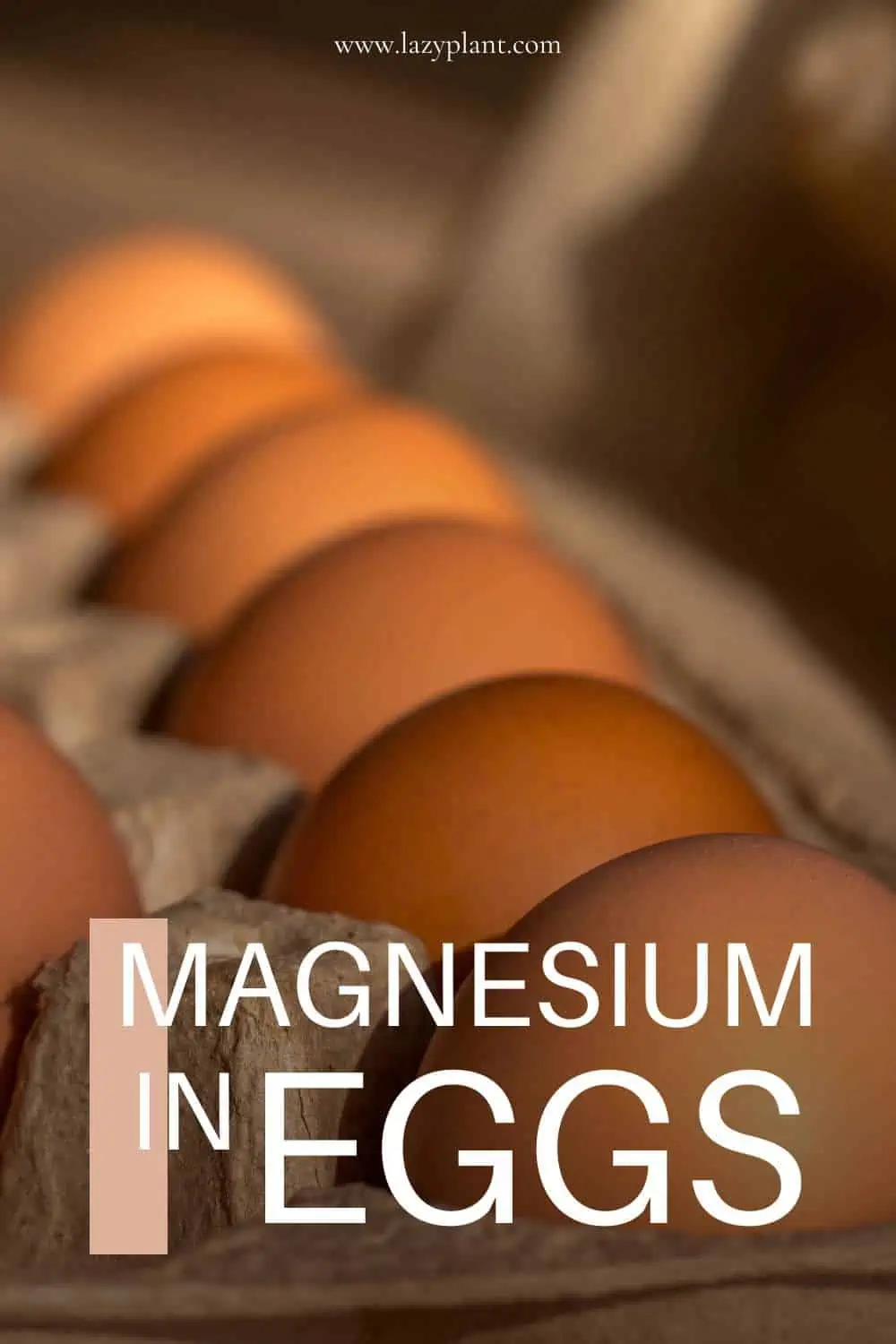Eggs have a low magnesium content. Although they contribute to the daily intake of magnesium, we have to eat many magnesium-rich foods to meet our daily needs.
What’s the magnesium content of eggs?
Whole eggs have approximately 11.4 mg of magnesium per 100g. A whole egg provides 5.7 mg of magnesium. This dose is 1.4% of the Daily Value (DV). In fact, two eggs provide 2.8% of the DV, whereas 3 eggs provide 4.1% of the DV.[1]

The white of an egg has more magnesium than the yolk. In fact, approximately 80% of the magnesium of an egg is found in its white. Only 20% of the magnesium of an egg is found in the yolk.
Does cooking methods affect the magnesium content of eggs?
Actually, magnesium isn’t vulnerable to heat, cold, or any processing method. Therefore, omelet, scrambled, hard-boiled, poached, or Benedict eggs have a similar magnesium content. Raw and cooked eggs have 11-12 mg of magnesium per 100g.
Only dried eggs have a significantly higher magnesium content. Dried whole eggs have 49 mg of magnesium, whereas dried white has 88 mg of magnesium per 100g.
You can find a wide variety of dried egg powders on Amazon.
Do we absorb magnesium from eggs?
We absorb approximately 30-50% of the magnesium of food. The absorption rate depends on the consumed dose. We absorb less magnesium when we get higher doses of magnesium. On the contrary, we consume more magnesium of eggs or other magnesium-rich foods, if we’re deficient in magnesium.[2]
How to eat eggs for increased magnesium absorption?
Several factors can influence magnesium absorption rates. Here are some key factors that can enhance magnesium absorption for eggs:
- Vitamin D: Adequate levels of vitamin D are associated with improved magnesium absorption. Ensure you get enough sunlight exposure or consider vitamin D supplements if needed.
- Vitamin B6: Vitamin B6 is involved in magnesium metabolism and may enhance its absorption.
- Protein: Adequate protein intake can enhance magnesium absorption. Include good sources of protein in your diet, such as lean meats, poultry, fish, dairy products, legumes, and tofu.
- Low calcium intake: While calcium is essential for health, high levels of calcium can interfere with magnesium absorption. Avoid excessive calcium supplementation if it’s not necessary for your health.

- Fiber: Dietary fiber, particularly soluble fiber, can bind to magnesium and potentially enhance its absorption. Whole grains, fruits, and vegetables are good sources of dietary fiber.
- Optimal pH levels: Magnesium absorption occurs in the small intestine, where the pH levels should be within a specific range for optimal absorption.
- Exercise: Regular physical activity has been associated with improved magnesium status. However, extreme exercise or excessive sweating may lead to magnesium loss and may require additional intake.
So, you could eat eggs with mushrooms, leafy green vegetables, and meat for increased magnesium absorption. The combination of these foods makes a meal rich in vitamin B6, fiber, and protein that has beneficial effects on the bioavailability of magnesium!
On the other hand, better to avoid adding too many dairy products, like cheddar cheese or cow’s milk, to your egg recipes.
Common foods high in magnesium
Magnesium is naturally found in both animal (milk, dairy, fish, meat) and plant-based foods, as well as certain beverages. Green leafy vegetables, legumes, pulses, nuts (e.g. walnuts), seeds, whole grains, and certain fruits are good sources of magnesium. In general, foods high in fiber are also high in magnesium.
If you want to boost your daily intake of magnesium, consume a serving of pumpkin or chia seeds, almonds, and spinach. They’re the richest common foods in magnesium. They provide 19-37% of the required daily intake per serving!
Moreover, bananas and avocados are the richest fruits in magnesium.
In addition, tap, mineral or spring water can be a good source of magnesium. However, the amount of magnesium in water significantly varies. It ranges from 1 mg per liter to more than 120 mg per liter!
Unfortunately, dietary surveys in the United States consistently show that many people consume less than the recommended daily intake of magnesium. But, following a well-balanced, plant-based diet can provide more than enough magnesium for healthy people.
You can boost your daily magnesium intake with dietary supplements.
You can find a wide variety of magnesium supplements on iHerb.
Always consult your physician before changing your diet or taking dietary supplements.
Magnesium-packed recipe ideas with eggs
While eggs themselves may not be high in magnesium, combining them with magnesium-rich ingredients like leafy greens, nuts, seeds, and whole grains can help increase overall magnesium intake in your diet.
Here are 8 recipes with eggs that, when combined with other magnesium-rich ingredients, can contribute to increased magnesium intake:
- Avocado and egg salad: Top a bed of mixed greens with sliced avocado and poached eggs. Avocado provides magnesium.
- Smoked salmon and egg bagel: Place smoked salmon and a poached egg on a whole-grain bagel. Salmon is a source of magnesium.
- Sweet potato and egg hash: Dice sweet potatoes, sauté them with onions, and top with fried or poached eggs. Sweet potatoes offer magnesium.
- Quinoa and vegetable stuffed peppers with egg: Fill bell peppers with a mix of quinoa and vegetables, and top with a baked egg. Quinoa is magnesium-rich.

- Vegetarian egg fried rice: Stir-fry brown rice with mixed vegetables and scrambled eggs. Brown rice adds magnesium to the dish.
- Egg and spinach wrap: Wrap scrambled eggs, spinach, and feta cheese in a whole-grain tortilla.
- Cauliflower and egg fried rice: Grate cauliflower as a rice substitute, stir-fry with vegetables, and mix in scrambled eggs.
- Egg and chickpea curry: Prepare a chickpea curry and poach eggs in a flavorful sauce. Chickpeas contribute to magnesium intake.
What’s the best time of the day to eat eggs for better magnesium absorption?
The timing of when you eat eggs may not significantly impact magnesium absorption, as magnesium is generally absorbed in the small intestine over the course of the day.
For optimal nutrient absorption and overall health, it’s more important to focus on having a well-balanced diet that includes a variety of magnesium-rich foods.
If you prefer eating eggs at breakfast, at least avoid drinking cow’s milk or adding any other dairy product to your recipe. High levels of calcium can interfere with magnesium absorption.
Nutritional value of eggs
Eggs are good for you because they’re packed with many vitamins and minerals. such as choline, vitamin A, vitamin B12, vitamin D, omega-3s, zinc, iron, calcium, and lecithin!
Also, eggs support weight loss as they’re low in calories.
However, we should eat eggs in moderation because they contain cholesterol and saturated fats.